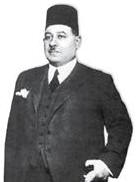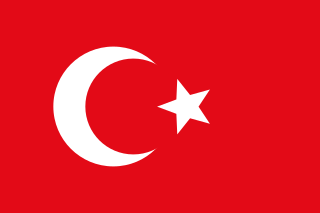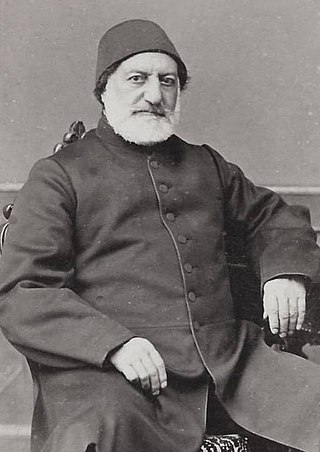
Mustafa Pasha was an Ottoman commander, born in Edirne and a paternal Uncle of Muhammad Ali of Egypt, who had fought against Russia and Napoleon's army in Egypt. He lost the Battle of Abukir in 1799. Mustafa Pasha was an ethnic Albanian.

Mustafa Pasha was an Ottoman commander, born in Edirne and a paternal Uncle of Muhammad Ali of Egypt, who had fought against Russia and Napoleon's army in Egypt. He lost the Battle of Abukir in 1799. Mustafa Pasha was an ethnic Albanian.
Mustafa Pasha may refer to:

Mohamed Tawfik Naseem Pasha was an Egyptian political figure of Turkish origin. He served as the prime minister of Egypt between May 1920 and 1921, again from 1922 until 1923, and finally between 1934 and 1936. He was also Minister of the Interior under Yusuf Wahba Pasha from November 1919 to May 1920. He was Minister of Finance in 1924.

Mustafa Fazıl Pasha was an Ottoman-Egyptian prince of ethnic Albanian descent belonging to the Muhammad Ali Dynasty founded by his grandfather Muhammad Ali Pasha.
Mustafa is one of the names of Prophet Muhammad, and the name means "chosen, selected, appointed, preferred", used as an Arabic given name and surname. Mustafa is a common name in the Muslim world.

Mustafa Reşid Pasha was an Ottoman statesman and diplomat, known best as the chief architect behind the Imperial Ottoman government reforms known as Tanzimat.

Ahmad Maher Pasha was an Egyptian politician from the Saadist Institutional Party who served as Prime Minister of Egypt from October 1944 to February 1945.
This is a list of ministers heading the Ministry of Foreign Affairs of Egypt.

The Eyalet of Sidon was an eyalet of the Ottoman Empire. In the 19th century, the eyalet extended from the border with Egypt to the Bay of Kisrawan, including parts of modern Israel and Lebanon.

Mustafa Naili Pasha was an Ottoman statesman, who held the office of Grand Vizier twice during the reign of Abdülmecid I, the first time between 14 May 1853 and 29 May 1854, and the second time between 6 August 1857 and 22 October 1857.

Lala Mustafa Pasha, also known by the additional epithet Kara, was an Ottoman Bosnian general and Grand Vizier from the Sanjak of Bosnia.

Mustafa Pasha Mosque is an Ottoman-era mosque located in the Old Bazaar of Skopje, North Macedonia.
The Royal Carriages Museum is located at the Citadel in Cairo, Egypt, in front of Suleiman Pasha Mosque. The museum was inaugurated in 1983, then it was re-inaugurated after its renovation in 2013. Further restoration took place from 2017 and the museum was reopened again in 2021. It houses a collection of unique Royal Carriages attributed to different historical periods, from the reign of Khedive Ismail until the reign of King Farouk, in addition to other collection of unique antiques related to the carriages.
Mustafa Kamal, Mostafa Kamal or variations may refer to:
Pasha was a high rank in the Ottoman political and military system, typically granted to governors, generals, dignitaries, and others. Pasha was also one of the highest titles in the 20th-century Kingdom of Egypt and it was also used in Morocco in the 20th century, where it denoted a regional official or governor of a district.

The Yemen Eyalet was an eyalet (province) of the Ottoman Empire. Although formally an integral part of the empire, the far-flung province was notoriously difficult to administer, and was often lawless. During the early 17th century, the Eyalet was entirely lost to the Yemeni Zaidi State, only to be recovered by the Ottomans two centuries later. The Yemen Eyalet was reorganized in 1849, upon Ottoman takeover of much of Greater Yemen territories. In 1872, most of it became Yemen Vilayet after a land reform in the empire.

Yusuf Kamil Pasha was an Ottoman statesman and Grand Vizier of the Ottoman Empire during the reign of Sultan Abdülaziz.

Çoban Mustafa Pasha was an Ottoman statesman. Likely born in Bosnia-Herzegovina or Serbian Sandzak, and collected through Devshirme to Janissaries, where he gradually rose through the ranks, he eventually served as kapıcıbaşı, vizier, and beylerbey for the Ottoman Empire during various parts of his life.
Kara Mustafa Pasha was an Ottoman statesman who served twice as the Ottoman governor of Egypt, firstly from 20 July to 9 October 1623 and secondly from 12 February 1624 to 16 May 1626. He also served earlier as the agha (chief) of the Janissary corps in 1623.
Köse Bahir Mustafa Pasha was an Ottoman grand vizier. His epithet Köse means "beardless". He was also known as Çorlulu Bahir Mustafa Pasha referring to his home town Çorlu. Before being grand vizier he was an imrahor.